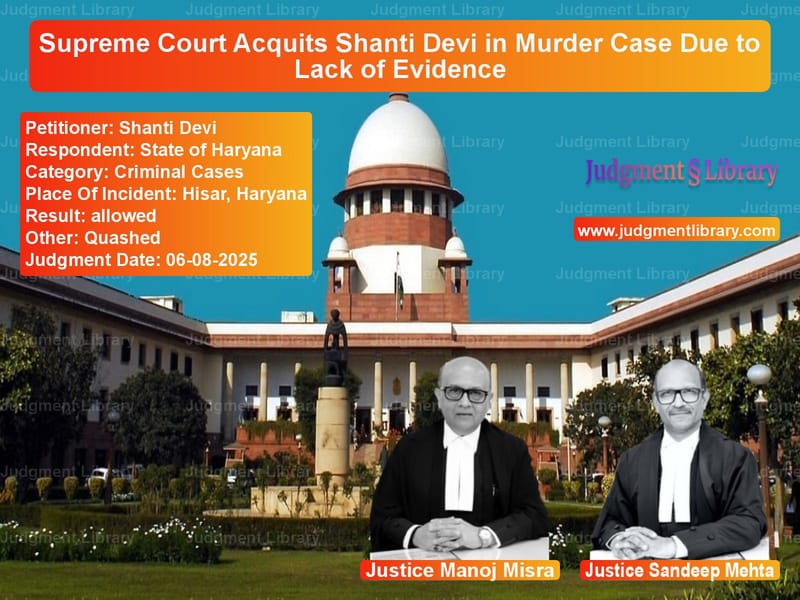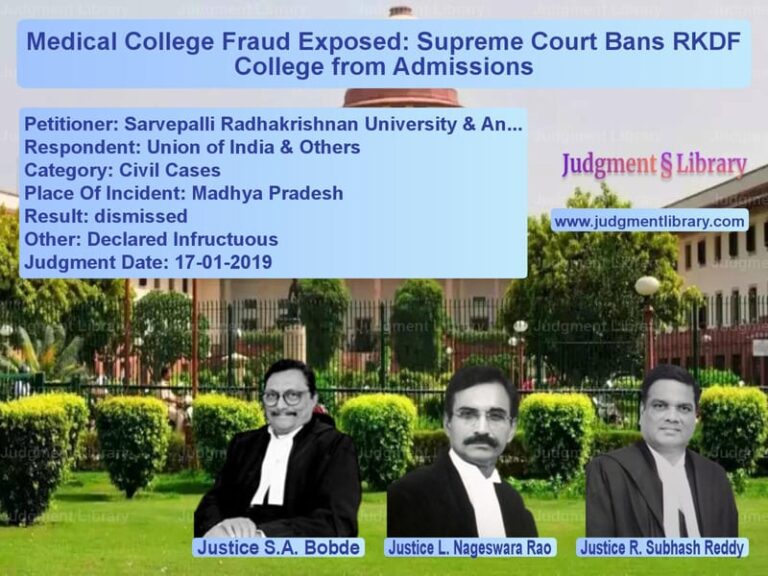Supreme Court Acquits Shanti Devi in Murder Case Due to Lack of Evidence
In a significant ruling that underscores the importance of solid evidence in criminal convictions, the Supreme Court of India has acquitted Shanti Devi in a murder case that had kept her behind bars for years. The judgment, delivered on August 6, 2025, highlights the critical legal principles that govern cases based entirely on circumstantial evidence and serves as a reminder that suspicion, no matter how strong, cannot replace proof in a court of law.
The case revolved around the murder of Balwant, whose body was discovered in a water works tank in Hisar, Haryana on December 23, 1997. The prosecution had built its case against Shanti Devi, her son Rajbir, and another accused Veena on several circumstantial pieces of evidence including motive, last seen together theory, extra-judicial confessions, and recovery of weapons. Both the trial court and the High Court had convicted all three accused, sentencing them to life imprisonment. However, the Supreme Court found fatal flaws in the prosecution’s case and set aside the convictions.
The Legal Framework for Circumstantial Evidence
The Supreme Court began its analysis by reiterating the well-established legal principles that govern cases based purely on circumstantial evidence. The Court emphasized that in such cases, the prosecution must prove the chain of incriminating circumstances beyond all reasonable doubt. The bench quoted verbatim from the celebrated case of Sharad Birdhichand Sarda v. State of Maharashtra, laying down the five golden principles:
“(1) the circumstances from which the conclusion of guilt is to be drawn should be fully established. It may be noted here that this Court indicated that the circumstances concerned ‘must or should’ and not ‘may be’ established. There is not only a grammatical but a legal distinction between ‘may be proved’ and ‘must be or should be proved’… (2) the facts so established should be consistent only with the hypothesis of the guilt of the accused, that is to say, they should not be explainable on any other hypothesis except that the accused is guilty, (3) the circumstances should be of a conclusive nature and tendency, (4) they should exclude every possible hypothesis except the one to be proved, and (5) there must be a chain of evidence so complete as not to leave any reasonable ground for the conclusion consistent with the innocence of the accused and must show that in all human probability the act must have been done by the accused.”
Examining the Theory of Motive
The prosecution had alleged two motives for the murder: first, that Shanti Devi was illegally occupying a room in Balwant’s house and refused to vacate it, and second, that Balwant was having an illicit affair with co-accused Veena. However, the Court found serious contradictions in this theory. The informant (PW-11), who was Balwant’s father, gave contradictory versions about whether Shanti Devi was occupying the room forcibly or as a tenant. The Court noted that these two versions were “diametrically opposite and cannot be reconciled.”
More importantly, the Court found it implausible that Balwant would frequently stay overnight in the same house where Shanti Devi lived if there was genuine enmity between them. The Court observed: “Had there been any acrimony in the relationship, Balwant (deceased) would not have taken the risk of staying in the very same house where the family inimical to him was staying.” The Court also noted that Savitri, Balwant’s wife, who would have been the best person to testify about his relationships, was surprisingly not examined as a witness.
The Problematic Extra-Judicial Confessions
The prosecution relied heavily on extra-judicial confessions allegedly made by the accused to various persons. However, the Court found these confessions to be unreliable and seemingly manufactured. The Court noted the remarkable coincidence that all three accused randomly approached completely unconnected persons to confess their crime and then asked for their assistance to be produced before the police.
The Court was particularly critical of the evidence regarding Veena’s confession, noting that it was made in the presence of police officials and thus hit by Sections 25 and 26 of the Indian Evidence Act, which make confessions to police officers inadmissible. The Court stated firmly: “Law is well-settled that confessional statement of an accused recorded in presence of a police officer cannot be admitted in evidence, except to the extent as provided under Section 27 of the Evidence Act.”
Regarding the quality of these confessions, the Court referred to Sahadevan v. State of Tamil Nadu, which laid down that extra-judicial confession is weak evidence by itself and must be examined with greater care and caution. The Court found that the similarities in the prosecution’s story about these confessions convinced them that “the theory of extra-judicial confessions is nothing but a cock and bull story created by the police.”
The Unreliable Last Seen Evidence and Recoveries
The prosecution presented Krishan @ Kuli (PW-15) as a witness who had seen the accused quarreling with the deceased on the day of the incident. However, the Court found him to be a “chance witness who has been planted by the prosecution.” The Court noted there was no plausible reason for the witness to be in that particular locality on that day, and his story about Rajbir approaching him 15-16 days after the incident to confess and request help in surrendering was “absolutely unworthy of credence.”
The recoveries of weapons also failed to impress the Court. The Forensic Science Laboratory report could not confirm the presence of human blood on the weapons (Kulhari and Bugda). The Court noted: “Seen in light of the FSL report, the recoveries allegedly effected at the instance of the accused-appellant Shanti Devi cannot be termed to be incriminating as they do not provide any link with the murder of Balwant.” The witness who recovered the weapons did not acknowledge the presence of any female accused during the recovery, contrary to the prosecution’s claim that the recoveries were made at their instance.
Extending Benefit to Non-Appealing Accused
In a significant humanitarian gesture, the Supreme Court extended the benefit of acquittal to Rajbir (accused No. 2), Shanti Devi’s son, who had not filed an appeal against his conviction. The Court noted that both Shanti Devi and Rajbir had been provided legal aid counsel in the High Court due to their poor financial status, which might have been the reason Rajbir didn’t file an appeal.
The Court quoted from Sahadevan’s case to justify this step: “Where the Court finds that the prosecution evidence suffers from serious contradictions, is unreliable, is ex facie neither cogent nor true and the prosecution has failed to discharge the established onus of proving the guilt of the accused beyond reasonable doubt, the Court will be well within its jurisdiction to return the finding of acquittal and even suo moto extend the benefit to a non-appealing accused as well… There can be varied reasons for a non-appealing accused in not approaching the appellate Court. If, for compelling and inevitable reasons, like lack of finances, absence of any person to pursue his remedy and lack of proper assistance in the jail, an accused is unable to file appeal, then it would amount to denial of access to justice to such accused.”
The Final Ruling
After a comprehensive analysis of all the evidence, the Supreme Court concluded that the prosecution had failed to prove any of the alleged incriminating circumstances. The Court held: “Consequently, we are of the firm opinion that the prosecution has failed to prove even a single of these so-called incriminating circumstances so as to justify the conviction of the accused-appellant for the charge of murdering Balwant (deceased).”
The Court allowed the appeal, set aside the judgments of the courts below, and acquitted Shanti Devi. The Court also directed that she be released forthwith if not wanted in any other case. In a compassionate conclusion, the Court also acquitted Rajbir and ordered his release, bringing closure to a legal battle that had lasted for nearly three decades and restoring the freedom of two individuals who had been convicted on the basis of evidence that couldn’t stand judicial scrutiny.
Petitioner Name: Shanti Devi.Respondent Name: State of Haryana.Judgment By: Justice Manoj Misra, Justice Sandeep Mehta.Place Of Incident: Hisar, Haryana.Judgment Date: 06-08-2025.Result: allowed.
Don’t miss out on the full details! Download the complete judgment in PDF format below and gain valuable insights instantly!
Download Judgment: shanti-devi-vs-state-of-haryana-supreme-court-of-india-judgment-dated-06-08-2025.pdf
Directly Download Judgment: Directly download this Judgment
See all petitions in Murder Cases
See all petitions in Attempt to Murder Cases
See all petitions in Custodial Deaths and Police Misconduct
See all petitions in Judgment by Manoj Misra
See all petitions in Judgment by Sandeep Mehta
See all petitions in allowed
See all petitions in Quashed
See all petitions in supreme court of India judgments August 2025
See all petitions in 2025 judgments
See all posts in Criminal Cases Category
See all allowed petitions in Criminal Cases Category
See all Dismissed petitions in Criminal Cases Category
See all partially allowed petitions in Criminal Cases Category







